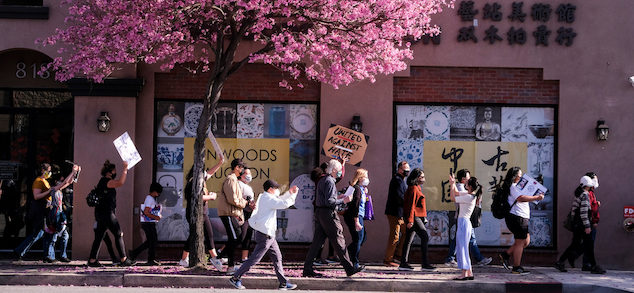Opinion
California needs to establish an Office of Racial Equity
 Demonstrators seeking racial justice for the Asian community at a March rally in Alhambra. (Photo: Ringo Chiu, via Shutterstock)
Demonstrators seeking racial justice for the Asian community at a March rally in Alhambra. (Photo: Ringo Chiu, via Shutterstock)As the nation continues to grapple with devastating police violence against African Americans and rising hate crimes against the Asian-American and Pacific Islander Community, many government leaders continue to talk a good game about the importance of racial justice.
We need a lot more than talk. It’s long past time to start dismantling the policies and practices that uphold injustice and oppression. But how? Establishing a State Office of Racial Equity would be a strong step in the right direction.
Across California and the nation, a growing number of local governments have created offices of racial equity. San Francisco, Sacramento, San Mateo, San Diego, Los Angeles, San Jose and Oakland are among the places developing strategic plans and tools to advance racial equity goals. They’re digging into the data, establishing benchmarks, tracking outcomes and collaborating with community leaders.
Creating an Office of Racial Equity would formalize the state’s commitment to addressing long-standing and systematic racial disparities that have often blocked the progress of people of color.
Now it’s time for the state of California to join them. Senate Bill 17 proposes to do just that by creating a statewide Office of Racial Equity that would be charged with identifying and eliminating racism in state policy and addressing inequality in state programs.
The need — and the possible role — for this office became clear during the COVID pandemic. As cases and death rates skyrocketed disproportionately in Black and Latinx communities, the governor’s staff responded to the emergency with a innovative Health Equity Metric.
Created by an ad hoc team, the Health Equity Metric essentially tracked testing capacities in the most at-risk communities (as defined by a measure called the California Healthy Places Index). The state then tied the ability to reopen business activity to the success of local officials in closing the gap between those communities and the county average.
With economic and equity incentives aligned, the Equity Metric not only identified the problem but created incentives to address it. And the state also helped: if the “COVID gap” was too high, the state provided resources and assistance to develop plans to increase testing and reduce transmission based on best practices from throughout the state.
California is rightly praised for this metric, but we need more than an ad hoc approach to tackle racial equity.
Creating an Office of Racial Equity would formalize the state’s commitment to addressing long-standing and systematic racial disparities that have often blocked the progress of people of color. It would identify when we are coming up short on achieving economic, social, and racial justice — and provide us numbers to hold ourselves accountable.
California and the nation have come a long way in the past year, thanks in large part to racial justice organizers…
The office would guide state agencies in creating their own racial equity plans, recommend policy and program reforms, and create a budget tool to assess how funding benefits or creates burdens for communities of color.
Health disparities laid bare in the COVID pandemic motivated State Sen. Richard Pan (D-Sacramento) to introduce legislation to create the Office of Racial Equity, governed by an independent Racial Equity Advisory and Accountability Council. He understands that it’s essential to confront how government policies have played a major role in perpetuating racism since the beginning of colonization and slavery.
California and the nation have come a long way in the past year, thanks in large part to racial justice organizers who have worked relentlessly to uphold the humanity of Black lives and demonstrate the public will for change.
These organizers strongly support creating this new office because they know that public accountability for racial equity is essential. And because they know the truth of the old adage – what isn’t measured isn’t likely to change.
We join them in calling on state leaders to act boldly and definitively on the defining moral issue of our time by approving SB17 and establishing California’s Office of Racial Equity.
—
Editor’s Note: Angela Glover Blackwell is Founder in Residence at PolicyLink. Manuel Pastor is director of the Equity Research Institute at the University of Southern California. Both were members of the Governor’s Task Force on Jobs and Business Recovery.
Want to see more stories like this? Sign up for The Roundup, the free daily newsletter about California politics from the editors of Capitol Weekly. Stay up to date on the news you need to know.
Sign up below, then look for a confirmation email in your inbox.

Leave a Reply